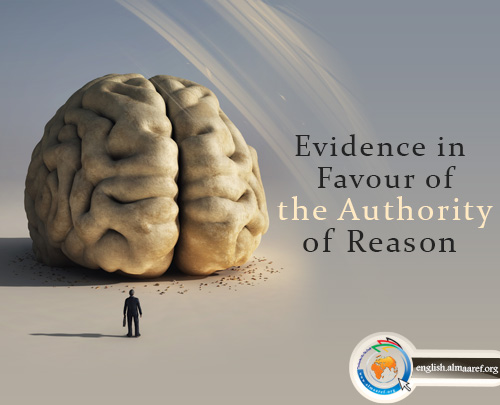The issue of the authority of reason in Islam is certain. Since the earliest times until the present, none amongst the Islamic scholars --except for a very small number-- has ever negated the authority of reason; they have counted it as one of the four sources of Islamic fiqh.
1- The Qur'an's Emphasis on Rationalism
Since our discussion is about the Qur'an, I think it necessary to produce arguments concerning the authority of reason from the Qur'an itself. The Qur'an, in various ways, confirms the authority of reason. About sixty to seventy verses can be cited --and that, too, for just one of the various ways, as mentioned-- in which the Qur'an indicates that such and such a matter has been mentioned for reason to reflect on. In one instance, the Qur'an refers to this issue in a striking statement:
﴾Surely the worst of beasts in God's sight are those that are deaf and dumb and do not reason﴿. (8:22)
Of course, it is obvious that the Qur'an does not mean the physically deaf and dumb, but those who do not want to listen to truth, or those who, when they hear, do not wish to admit it with their tongues. In the view of the Qur'an, the ears which are unable to listen to truth and which are only used for listening to absurd and nonsensical things, are deaf. The tongue which is merely used to utter nonsense, is dumb. The people who do not reason, are those who do not make use of their intellect and their faculty of thought. Such are not fit to be called human beings. The Qur'an includes them among the beasts. In another verse, while bringing up a subject related to Divine Unity (al-tawhid), the Qur'an refers to the issue of unity of Divine Acts, and says:
﴾It is not for any soul to believe, save by the leave of God...﴿ (10:100)
After stating this profound issue --a problem which is not easily comprehensible to every human mind-- the Qur'an continues the verse like this:
﴾And He lays abomination upon those who do not reason.﴿ (10:100)
In these two verses, which I quote here for the sake of example, the Qur'an, in the terms of logic, invites us to ratiocination. There are many other verses in the Qur'an which, on the basis of consequential signification, can be said to accept the authority of reason. In other words, the Qur'an makes statements which cannot be accepted without accepting the authority of reason. For instance, an opponent is asked to forward rational argument in favour of his position:
﴾Say: Bring your proof if you are truthful.﴿ (2:111)
This can only be inferred to mean the Qur'an's ratification of the authority of reason. In another place it uses syllogistic argument to prove the existence of the Necessary Being (wajib al-wujud):
﴾Were there gods in them [earth and heaven] other than God, they would surely disintegrate ...﴿ (21:22)
In these verses the Qur'an has framed a conditional proposition, which exempts or excludes the antecedent premise for arriving at a conclusion which is consequent upon it. Thus the Qur'an aims at emphasizing the role of reason and refutes the view of some of the religions that faith is alien to, or, is incompatible with reason, and that to embrace faith one has to suspend his rational faculty and concentrate upon heart alone, so that it may absorb the Divine light and become illuminated by it. This view is totally negated and refuted by the Qur'an.
2- References to the Law of Causality
The other argument that supports the view that the Qur'an approves of the ultimate authority of reason, is that it defines various problems in terms of cause-and-effect relationship. The cause-and-effect relation-ship, or the law of causation, is the foundation of rational thinking. This law is honoured by the Qur'an and is also employed by it. The Qur'an speaks on behalf of God, the Almighty, the Creator of the system of cause and effect. Despite the fact that His Word transcends the limitations of causality, the Qur'an is not oblivious of pointing out to the system of causality operating in the universe; it views all phenomena and events as being subservient to this system. The following verse supports this view:
﴾God changes not what is in a people, until they change what is in themselves ...﴿ (13:11)
The Qur'an intends to say that, although all destinies depend on the Will of God, He never imposes upon human beings such fate as is outside and alien to their determination, will and action. The destinies of societies also change according to their intrinsic system of functioning. God does not extravagantly alter the destiny of a nation without any specific reason, unless they themselves bring about a major change in their system of social and moral values and their manner of performing their individual duties.
The Qur'an urges Muslims to study the conditions and circumstances of societies of the past and to take lesson from their history. It is evident that if the destinies of races and nations were random, or dependent upon accidents, or were prescribed from above, the advice to study and draw a lesson would not have any sense. By laying emphasis on it, the Qur'an intends to remind us that a uniform system of laws governs the destinies of all the nations of the world. It also reminds us that if the conditions of a society in which we live, are similar to the conditions prevalent in a society of the past, the same fate awaits us too. Elsewhere, the Qur'an says:
﴾How many a city We have destroyed in its evildoing, and now it is fallen down upon its turrets. How many a ruined well, a tall palace. What, have they not journeyed in the land so that they have hearts to understand with, or ear to hear with ...?﴿ (22:45-46)
From this statement, we can infer that the affirmation of the law of causality and the approval of the cause-and-effect relationship, imply the acceptance of authority of reason.
3- Rational Basis of Divine Commands
Another argument which proves that the Qur'an believes in the ultimate authority of reason, is that the Qur'an always explains the rationale behind its commands, laws and precepts. The scholars of usul al-din (the principles of the Faith) maintain that the harms and benefits caused by human deeds are among the reasons behind laws and commands. For example, while at one place the Qur'an ordains the performance of prayers, in another place it explains the philosophy of prayer:
﴾Indeed prayer forbids indecency and dishonour ...﴿ (29:45)
* Uniqueness of The Quran. By Murtada Mutahhari.




















